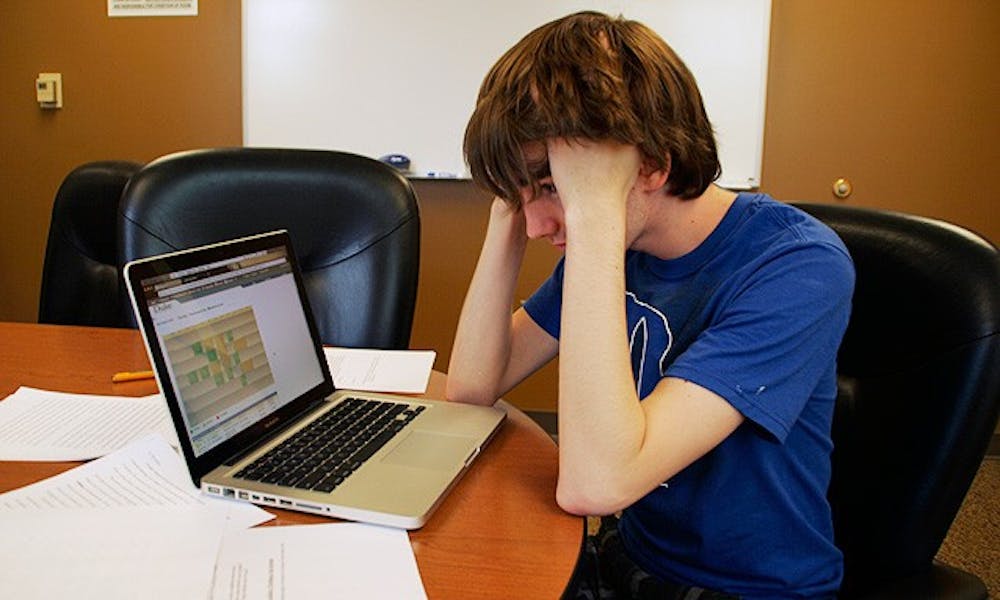Members of Duke Student Government and the administration are working to improve the often-criticized undergraduate advising system.
Students have said one of the biggest weakness of advising is a poor matching process between student and adviser, as some students said advisers often do not necessarily fit their needs. This can especially be a problem for incoming freshmen who feel a lack in resources available to help in the academic process, said junior Kaveh Danesh, DSG vice president for academic affairs.
“As [an incoming] freshman, I remember feeling shocked that the only resources I was given was a blue book and an advising hotline,” Danesh said.
Danesh, who was reelected in early April, is spearheading academic and pre-major advising reform, which was a key issue on his platform. The majority of complaints from students about advising is that advisers are not meeting the expectations of their advisees, noting that some students want a mentor, while others want quick appointments.
One of the changes Danesh is implementing is a system that will allow incoming students to bookbag their preferred classes based not only on the course synopsis but also on a short video about the course. Students’ selections will be compiled into a list forwarded to their advisers as well as archived, so students can refer back to the list or monitor how their interests have changed. He noted that it has not yet been determined if ACES can accommodate this new system featuring course videos.
The administration is also working to improve the advising process, though many changes have already taken place, Lee Baker, dean of academic affairs of Trinity College, wrote in an email Monday.
Elizabeth Fox, associate dean of Trinity College, was appointed the new director of the Academic Advising Center in August, and the center underwent an external review as well as a “retooling” of their peer adviser program, Baker said. The center has also developed its global adviser program and will remodel the first floor of its office in the near future.
Baker added that some of the problems with the adviser-student relationship can be attributed to students.
“Most of our pre-major advisers work really hard and care deeply about the success of our students,” he said. “Too often, however, students view their advisers as simply ‘functional,’ which is not desirable.”
Fox said her two main strategic goals for advising are to make students feel as welcome as possible—especially throughout their freshman and sophomore years—and encourage advisers to promote the skills students need to become an intellectual in the public sphere, regardless of their eventual career paths.
“I’d like all first-year students to feel welcomed as a member of Duke’s community of scholars—a membership that confers both rights and responsibilities toward all of its members,” she wrote in an email Wednesday.
Many freshmen, however, said they do not feel comfortable with the academic choices they have to make as incoming students.
“I think it is a really inefficient system and [advisers] don’t really cater to the kids that much,” said freshman Christina Malliris, adding that she wished students were able to meet or communicate with their advisers before arriving at Duke and choosing classes for the first time.
Currently, students are matched with advisers based on their residence halls freshman year. Baker said this system is indeed arbitrary but noted that an element of randomness and having “generalist advisers” is important because students’ interests often change.
The key to resolving some of these issues within advising is matching students to more appropriate advisers, Danesh said, though he added that he does not think the current neighborhood assignment process poses major difficulties.
“The ideal model is for students to answer a questionnaire about what their passions are and what they want out of their advising relationships,” he said. “Asking advisers similar questions will allow us to better pair students with their advisers.”
Danesh also noted the importance of peer advising and current students’ ability to aid incoming freshmen. For example, Danesh wants to send current students to the send-off parties to discuss the academic process. He also wants to implement student liaisons between incoming students and specific academic departments and enable these students to post videos answering students’ questions online.
“The send-off parties give us a very nice mechanism for prospective students to meet and talk to students who can speak to the academic experience at Duke,” he said. “We want to change the dynamic of the send-off parties, we want to make people feel comfortable about what they are getting into with the plethora of academic experiences they will be facing in the next four years.”
Danesh said he hopes most of the improvements he is working on will be ready for the Class of 2015.
Get The Chronicle straight to your inbox
Signup for our weekly newsletter. Cancel at any time.

